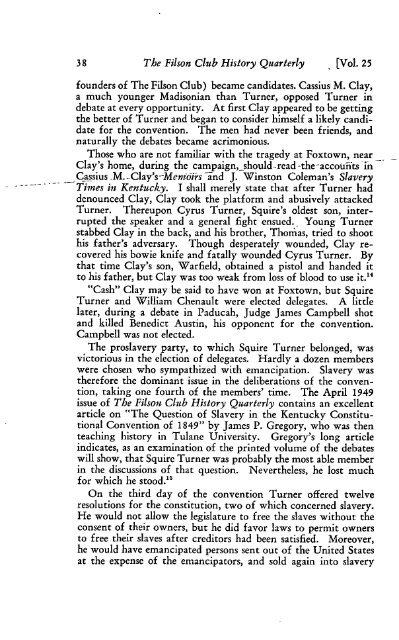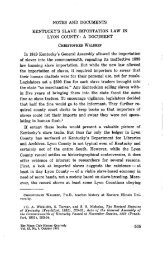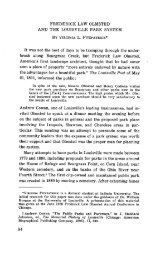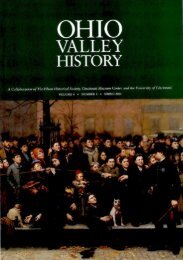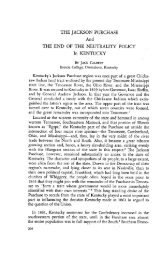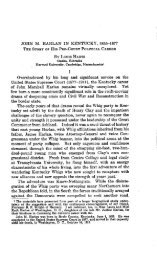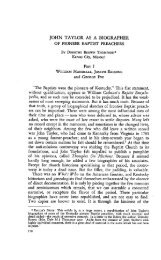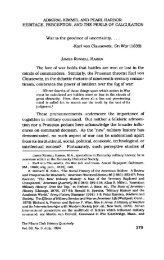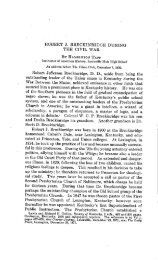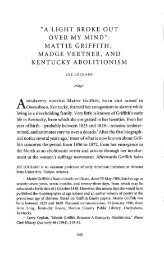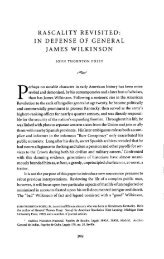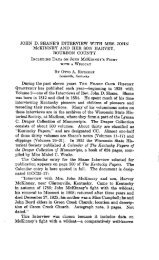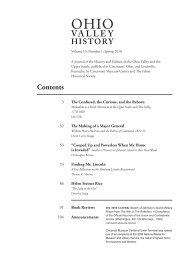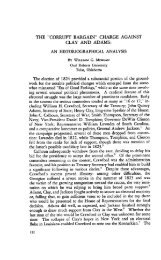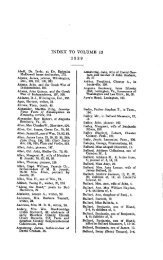MAJOR SQUIRE TURNER From a Portrait " - The Filson Historical ...
MAJOR SQUIRE TURNER From a Portrait " - The Filson Historical ...
MAJOR SQUIRE TURNER From a Portrait " - The Filson Historical ...
You also want an ePaper? Increase the reach of your titles
YUMPU automatically turns print PDFs into web optimized ePapers that Google loves.
38 <strong>The</strong> <strong>Filson</strong> Club History Quarterly , [Vol. 25founders of <strong>The</strong> <strong>Filson</strong> Club) became candidates. Cassius M. Clay,a much younger Madisonian than Turner, opposed Turner indebate at every opportunity. At first Clay appeared to be gettingthe better of Turner and began to consider himself a likely candidatefor the convention. <strong>The</strong> men had never been friends, andnaturally the debates became acrimonious.Those who are not familiar with the tragedy at Foxtown, nearClay's home, during the campaign, should-read-the-aecouhts in - -Cassius M.-Clay's-Menc6ii.s-and J. Winston Coleman's Slavery--Times in Kentuclty. I shall merely state that after Turner haddenounced Clay, Clay took the platform and abusively attackedTurner. <strong>The</strong>reupon Cyrus Turner, Squire's oldest son, interruptedthe speaker and a general fight ensued.. Young Turnerstabbed Clay in the back, and his brother, Thon•as, tried to shoothis father's adversary. Though desperately wounded, Clay recoveredhis bowie knife and fatally wounded Cyrus Turner. Bythat time Clay's son, Warfield, obtained a pistol and handed itto his father, but Clay was too weak from loss of blood to use it. **"Cash" Clay may be said to have won at Foxtown, but SquireTurner and William Chenault were elected delegates. A littlelater, during a debate in Paducah, Judge James Campbell shotand killed Benedict Austin, his opponent for the convention.Campbell was not elected.<strong>The</strong> proslavery party, to which Squire Turner belonged, wasvictorious in the election of delegates. Hardly a dozen memberswere chosen who sympathized with emancipation. Slavery wastherefore the dominant issue in the deliberations of the convention,taking one fourth of the members' time. <strong>The</strong> April 1949issue of <strong>The</strong> <strong>Filson</strong> Club History Quarterly contains an excellentarticle on "<strong>The</strong> Question of Slavery in the Kentucky ConstitutionalConvention of 1849" by James P. Gregory, who was thenteaching history in Tulane University. Gregory's long articleindicates, as an examination of the printed volume of the debateswill show, that Squire Turner was probably the most able memberin the discussions of that question. Nevertheless, he lost muchfor which he stood. TMOn the third day of the convention Turner offered twelveresolutions for the constitution, two of which concerned slavery.He would not allow the legislature to free the slaves without theconsent of their owners, but he did favor laws to permit ownersto free their slaves after creditors had been satisfied. Moreover,he would have emancipated persons sent out of the United Statesat the expense of the emancipators, and sold again into slavery


